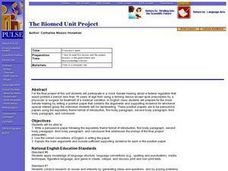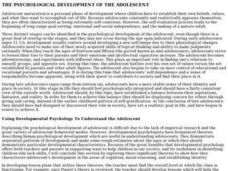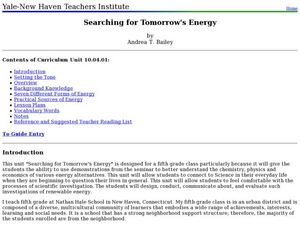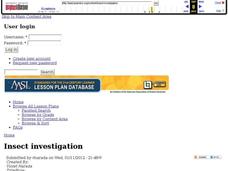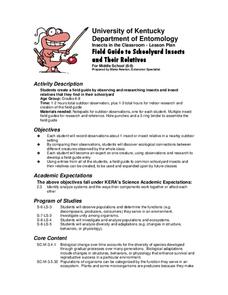Curated OER
Watch the Screen!
Learners explore screening processes for biological activity. In this deep sea lesson students complete a lab activity.
Curated OER
Systematics: Classifying Organisms
Students describe the techniques biologists use to classify organisms. In this biology lesson, students create cladograms and phylogenetic trees. They list the levels of taxonomic hierarchy.
Curated OER
Man's Best Friend
Students compare human and dog senses. In this biology lesson, students describe different ways that dogs help humans. They research and create a presentation about a modern dog hero.
Curated OER
Wildlife Sampling-Capture-Recapture
Seventh graders simulate the capture-recapture method of population sampling using beans. In this biology lesson, 7th graders calculate the total population of beans in the bowl. They assess whether this method is reliable or not.
Curated OER
Photosynthesis
Seventh graders investigate a multidisciplinary unit with an emphasis in using technology in order to engage them. The students perform Internet research about photosynthesis with a written assessment taken from the WebQuest.
Curated OER
Biological Relationships - Coral Reef Memory Game and Chain Game
Students familiarize themselves with the interconnectedness of species within an ecosystem, and to use this knowledge to evaluate how the removal or decimation of one species can have far reaching effects.
Curated OER
Biodiversity Study -- A Unit Study
Learners sample a site with low human impact, one with moderate human impact, and a third with high human impact. Students chart the data for each site and then compare the sites and discuss.
Curated OER
Lake Superior Ecology Unit
Sixth graders research Lake Superior and its ecosystem. Students investigate the lake's cycles of mixing and stratification and how these cycles affect the biology of the lake. This lesson plan contains five days of activities.
Curated OER
STS Biology - Teaching Controversial Topics
Each of the three activities submitted presents difficult science topics in the context of the human experience. The activities focus on real-world problems, which have science components, from the students' perspectives.
Curated OER
The Best Place in the United States to Live
Students, working in small groups, analyze information provided in U.S. maps to make a logical determination of the best place to live in the United States in regards to natural and human-made hazards. Then, working individually, they...
Curated OER
Three Cold Realms
Students identify organisms within the realms of pelagic, benthic and sea ice. They explain how these three interact with each other.
Curated OER
The Biomed Unit Project
Young scholars write a persuasive paper following the expository theme format of introduction, first body paragraph, second body paragraph, third body paragraph, and conclusion that addresses the prompt of the final project adequately....
Curated OER
The Physiological and Psychological Development of the Adolescent
Students examine the life of a teenager from their own perspective and an adult's. In groups, they focus on the biological changes and how they are different in a girl and a boy. Individually, they write a paper about these changes and...
Curated OER
Catering Middle-School Science: Monomers, Polymers, and Macromolecules
Students investigate foods. In this biology lesson plan, students will conduct testing on different types of foods as they learn about different molecules that make them up. Students will also learn about the shapes of the molecules.
Curated OER
Microbial Influence on Earth's Systems
Learners identify the different biogeochemical cycles on Earth. In this biology activity, students observe microbes under a microscope. They compare and contrast respiration and photosynthesis.
Curated OER
Searching for Tomorrow's Energy
Fifth graders investigate energy. In this biology lesson plan, 5th graders will learn about energy, fossil fuels, and renewable and nonrenewable resources. Students will be participating in three lab activities which are described in...
Curated OER
Species Diversity in Ecosystems with Different Techniques of Land Management
Students visit numerous places to help in their understanding of Ecology. In this biology lesson plan, students will learn about characteristics and how to identify numerous plants and animals. This lesson plan allows for many field trip...
Curated OER
Food for Thought
Fifth graders explore the brain and what is needs. In this biology lesson plan, 5th graders will work on a series of activities that will allow them to learn about the brain, its parts, and the best foods to eat for their brain.
Curated OER
Life Systems- Zoo Central
Students investigate the various aspects associated with living things while also concentrating on their basic needs. They explore the aspects of movement and growth in plants and animals. This is done through research and other...
Curated OER
Medical Explorer
After reading a case study, pupils will explore possible diagnoses, assessment, and treatment plans. Finding the definitions to medical vocabulary and sorting through patient history, they will begin to understand the process of...
Curated OER
Insect Investigation
Investigation is a brilliant way to spark scientific inquiry. First graders will identify, research, and report what they have learned about a mysterious bug found on the playground. They will use multimedia resources for research and...
Curated OER
Investigate Science Using Crayfish
Young scientists discover the importance of scientific investigation by observing live crayfish. They carefully observe the patterns of crayfish in different environments. Then they discuss their conclusions and define what all living...
Curated OER
Human Body Corp.
Learners investigate body systems by participating in a role-play activity. Third, fourth, and fifth graders pretend that they are an organ or system of the human body, and they must write a letter to the body "corporation" discussing...
Curated OER
Field Guide to Schoolyard Insects and Their Relatives
Your entire class works together to create an illustrated insect field guide. The intent is that they venture outside of the classroom, find a critter, and then research it using reference materials, insect books, and the Internet for...













